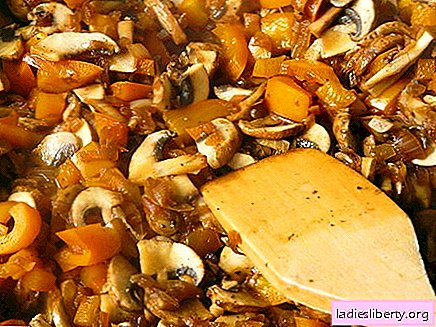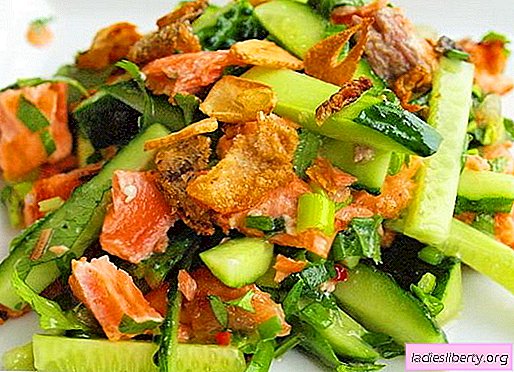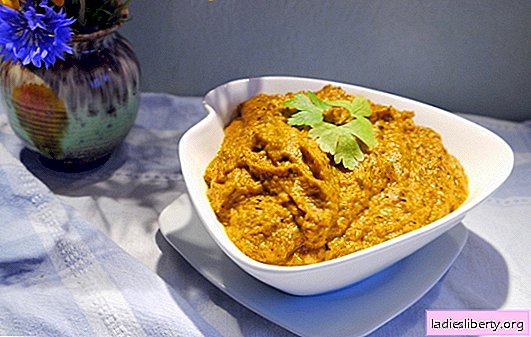
There are many myths and speculations around breastfeeding.
Some say that some foods are prohibited, others eat them and this does not affect the baby.
For example, cottage cheese is useful for the body of a woman and a child, but can it not cause a sick stomach or severe allergies in crumbs?
Is it possible to nursing cottage cheese and what is its use
Cottage cheese belongs to the category of dairy products. Its composition is rich in vitamins of groups A, B, E, C and PP. The use of this product has a positive effect on the body of the mother, and on the fragile body of the baby.
Due to the high content of calcium, the child's bones and muscles are strengthened, a strong skeleton is formed. It also promotes the growth of hair, nails and teeth, which is especially important for babies.
Vitamins in the composition of cottage cheese strengthen the immune system of mother and baby, reduce the risk of many diseases.
Any mother will answer the question whether nursing cottage cheese will respond positively, knowing that it contributes to a better development of her child both physically and intellectually.
Cottage cheese is especially valuable for babies in the first month of their birth. It is at this time that the child develops and adapts. To get both the mother and the baby all the necessary benefits of the product, a woman should consume no more than 100 g. Fat content of cottage cheese is also important. It is optimal to choose between 5 and 9%. A too fat product will increase the fat content of milk, which can cause severe intestinal upset in the baby.
Is it possible to nursing cottage cheese and how it can be dangerous
The main restriction in the use of cottage cheese lies in the tolerance of the product by the mother. If she has adverse reactions of the body to cottage cheese, then with a greater degree of probability it can be said that the baby product will cause the same reaction. Often in infants already in the first day after the use of cottage cheese by the mother can be observed:
● bloating;
● diarrhea;
● constipation;
● the appearance of loose stools;
● allergic rashes and redness.
To prevent such troubles, it is necessary to introduce cottage cheese into the diet carefully and gradually. You need to start literally with a teaspoon, every day increasing the dose to the prescribed 100 g per day.
Is it possible for nursing cottage cheese and is it worth it to risk for the benefit of the child, if the mother has an individual intolerance to the product? In these cases, breastfeeding experts advise replacing the fermented milk product with natural yogurt or fermented baked milk.
When using cottage cheese, it is important to monitor its quality. A stale product not only does not bring benefits, but can also harm mom and baby. The reaction is completely unpredictable. It can be just an upset bowel or severe poisoning, which is very dangerous especially for babies.
Is it possible to nursing cottage cheese and in what form to use it
Cottage cheese is a useful product necessary for the normal functioning of the whole organism. However, often mothers ask themselves: to get all its useful properties, is it necessary to eat curd only in its pure form? During lactation, you want to eat not only healthy, but also delicious. Cottage cheese itself is not a delicacy, so mothers tend to include it in different dishes.
Cottage cheese with sour cream
Cottage cheese, seasoned with sour cream and sugar, can be considered a treat. However, to avoid worrying the baby, you need to give preference to low-fat varieties of sour cream.
It is believed that cottage cheese with low-fat sour cream has a positive effect on the formation of the mental activity of the child in the first month of his birth. However, there are some limitations. This dish significantly loads the liver, so it is better for them to feast on the morning.
Dumplings with cottage cheese
After heat treatment, the cottage cheese somewhat loses its useful properties. Its only plus is that it becomes less allergenic. If mother wants to treat herself to dumplings with cottage cheese, then there are no prohibitions for this. If they don’t benefit, then they won’t do much harm.
It is worth mentioning that dumplings are better to cook on their own, since purchased ones are a dubious pleasure. It is not clear what quality cottage cheese is used there. Also, various impurities can be added during production to improve palatability. And this can seriously affect the health and development of crumbs.
Cottage cheese casserole
This product has the same beneficial properties as cottage cheese in its purest form. The casserole is very simple to prepare.
You will need:
● a pack of fresh cottage cheese;
● 2 chicken eggs;
● 3 tbsp semolina;
● sugar to taste.
Cooking:
The baking dish is lined with baking paper.
All ingredients are mixed and laid out in a mold.
The oven warms up to 180 degrees.
The form is sent to prepare for half an hour.
You can diversify the casserole by adding exotic fruits or dried fruits, but before that you need to make sure that the baby does not respond to these products with allergies or indigestion.
Curd rolls
Tasty for mom and healthy for the baby treat, which is quickly and easily prepared.
You will need:
● chicken or turkey fillet;
● 100 g of cottage cheese (non-greasy);
● a bunch of dill;
● 50 g of low-fat cheese;
● cream 10%;
● salt to taste.
Cooking:
The bird fillet is cut into long pieces, beaten well with a hammer, salted and left to soak for 10 minutes.
The cheese is rubbed on a fine grater and mixed with cottage cheese and dill.
The curd cheese mixture is whipped in a blender until smooth.
Each piece of poultry is greased with the resulting mass, curled up and stabbed with a toothpick.
Rolls are laid out in a baking dish and poured with cream (roll should be "drowned" in half).
Top can be sprinkled with the remaining grated cheese.
Chicken rolls are baked at 180 degrees for half an hour, in turkey rolls - 40 minutes.
After that, a tasty and healthy dish is ready!
Is it possible to nursing cottage cheese in its pure form or as part of dishes? Even you need it already in the first month of the baby's birth. However, you need to carefully select the product, monitor its fat content and shelf life. Cottage cheese should be introduced into the diet carefully, observing the condition of the baby. If it does not change and the new product does not bother the baby, then mom can pamper herself with casserole, and dumplings, and cottage cheese in its purest form.











